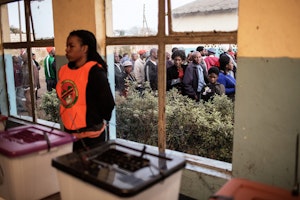Dirty Money, Murky Deals: Europe’s Role Facilitating Corruption
By Saname Oftadeh
Money laundering and tax fraud have become particularly unpalatable, and sometimes embarrassing, to governments struggling to reduce their deficits. Recent developments such as the investigation into former French Minister for the Budget, Jérôme Cahuzac, the collapse of Cypriot banks, and the launch of an Offshore Leaks website documenting offshore accounts of prominent public figures, have given new momentum to EU legislators working on financial and banking sector regulation.
But strengthening transparency and accountability within EU borders is not just about increasing revenue for European treasuries. It has a significant impact on the populations of non-EU countries as well as the credibility and effectiveness of the EU’s own foreign policies. It is not only Europe’s elites who exploit the loopholes and poor enforcement of EU banking regulation. Europe’s banks also serve as a haven for public funds stolen by the political and business leaders of some of the world’s poorest countries. This undermines the EU’s aid and development policies, and conflicts with the principles of good governance that the EU attempts to promote abroad.
The report Deception in High Places: The Corrupt Angola-Russia Debt Deal, authored by Andrew Feinstein, a former South African member of parliament and current director of Corruption Watch UK, details how corrupt political leaders, civil servants and arms dealers were able to siphon off and hide public funds using European banks. By 1996, at the end of a two decade-long civil war, Angola had racked up a U.S. $5 billion debt to Russia that it was in no position to repay. Both countries agreed to commute the sum to $1.5 billion. Such debt restructuring agreements are not unusual in themselves. But the decision to mandate a shell company with no assets and no financial expertise to serve as intermediary in the deal (and created for this sole purpose) is more suspect, particularly considering that the company was founded by MM. Pierre Falcone and Arcadi Gaydamak, both notorious for their involvement in the “Angolagate” scandal concerning illegal arms sales.
Deception in High Places outlines how funds for Angola’s debt repayment were paid by its national oil company, Sonangol, to Abalone, which diverted hundreds of millions of dollars via its account at UBS bank in Switzerland (formerly SBS), and later banks based in Cyprus, the Netherlands and Luxembourg. Payments have been tracked to Falcone’s and Gaydamak’s accounts, as well as a to several high-ranking Angolan officials, including President José Eduardo Dos Santos himself, who gained over U.S. $36 million of stolen public funds. Furthermore, the European banks involved in the deal failed to conduct the necessary and legally required due diligence investigations into these transactions.
In 2000 the Swiss authorities opened an investigation into the debt deal but this was later abandoned. Angolan civil society organizations have recently reopened a criminal case with the Swiss federal prosecutor against Falcone and Gaydamak, Angolan politicians, as well as senior employees from UBS responsible for the Abalone account. The claim includes allegations of bribery, breach of trust, criminal conspiracy and money laundering.
The diversion of public funds is not to be taken lightly in any context, and much less in a country such as Angola. First, funds systematically diverted from the national treasury diminish public spending on education, health, sanitation, electricity, and housing that could (in this case) have benefited both the Angolan and Russian populations. Second, the scandal is fuelling a vicious circle that prevents democratic progress by maintaining a system of corruption among high ranking government officials who have been in power for decades. The list of names included in the allegations is striking. Not only is President Dos Santos himself involved, but so, allegedly, are Elisio De Figueiredo, former ambassador to France, Joaquim David, Minister of Industry and former Director General of Sonangol, José Paiva da Costa Castro, former Director General of Sonangol UK, and José Leitão da Costa, Minister in the Office of the Angolan Presidency. The allegations suggest that the top circle of Angolan leaders have been using the European financial system to steal public money. If it is the EU’s policy to promote democratic governance and human rights in Africa, how can it maintain its credibility while aiding the corrupt political elite to maintain its hold on power and accumulate illegally acquired wealth?
Several initiatives are currently under discussion at EU level that could make this kind of corruption more difficult. First, the European Parliament and member-states recently reached an agreement on rules requiring the disclosure of all payments made by EU extractive and forestry companies in third countries. Such transparency would make it easier for national populations to hold their governments to account for how they use income generated from the country’s natural resources. Second, the European Parliament also recently voted on new legislation that will require banks to disclose all profits made and subsidies received country-by-country, and the European Commission has published a proposal for a fourth Anti-Money Laundering Directive. This legislation will help ensure that European banks and intermediaries involved in such shady deals investigate and report any suspicious activity, and are held accountable through appropriate sanctions where they fail to do so. The Directive should also require that the beneficial owners of companies (the person who ultimately receives the profits) are known, not only to the companies themselves, which is not always the case, but also to governments and to the public.
The EU has to take a strong stand on these new policies and learn its lesson from the various scandals currently tarnishing its image. The EU is responsible for delivering on its promises, and turning its declarations of intent on good governance and the fight against corruption into concrete actions for the benefit of the people of Europe and Africa.
Until May 2013, Saname Oftadeh was a policy intern with the Open Society Foundations.
